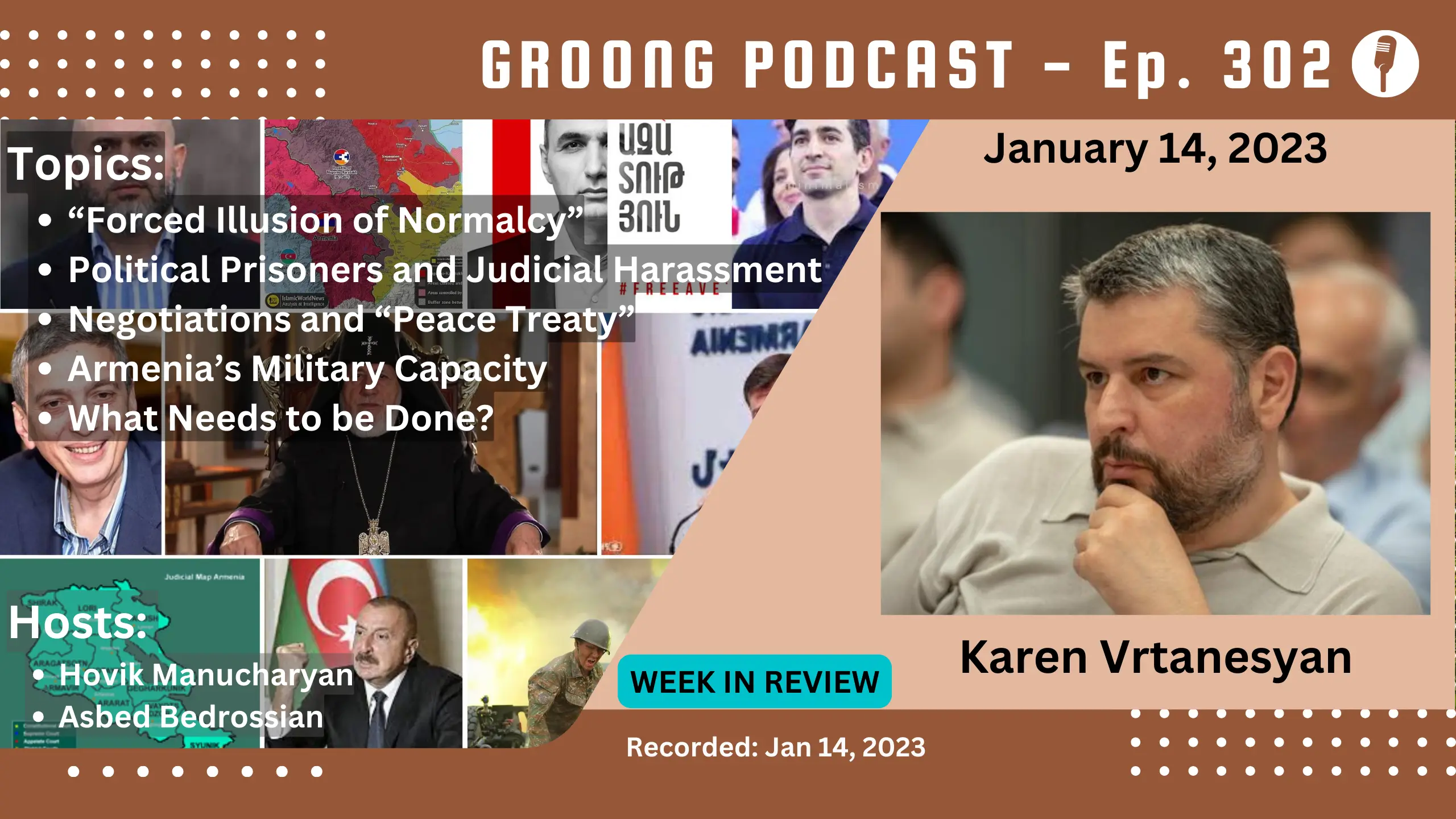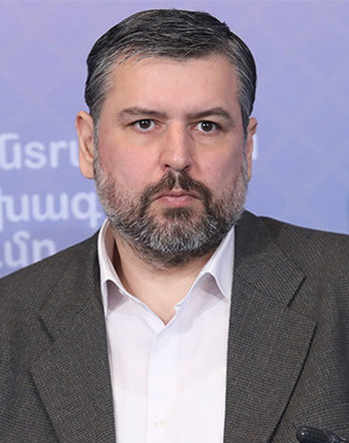
Groong Links:
Guest:
Topics:
- “Forced Illusion of Normalcy”
- Political Prisoners and Judicial Harassment
- Negotiations and “Peace Treaty”
- Armenia’s Military Capacity
- What Need to be Done?
- Thoughts from the Participants
Episode 302 | Recorded: January 14, 2024
Show Notes
“Forced Illusion of Normalcy”
Traditionally, New Year’s Eve is one of the most popular holidays in Armenia (and the former Soviet Union). The vast majority of people ring in the new year at home with family and friends.
This year, on December 31, Hovik and Karen and many others were on the streets of Yerevan, and not on Republic Square with the big Christmas tree and a countdown clock and big crowds.
Questions:
- What was the purpose of the event and why was it important?
- What was the outcome and reaction? How did people come away from it?
- What narratives are sponsored and propagated by government-run media?
- What do we want people to remain aware of?
Political Prisoners and Judicial Harassment
Over the past month, there have been several prominent court cases that Western Ambassadors and analysts have no idea about.
- Avetik Chalabyan’s sentence
- First time in history (apparently) where individual is being deprived of political activity
- Before Chalabyan’s verdict, we remember that he was detained for months based on fears that he would interfere with his own case. This is a default modus operandi, it seems, for most suspects who happen to pose a political threat to Nikol Pashinyan
- Armen Ashotyan’s trial and detention
- He has now been in custody for more than 6 months and his detention was extended by another 3 months.
Karen, you are active in talking about political prisoners and cases of judicial harassment in Armenia. Your friends have recently started the Armenian Center for Political Rights and have already issued a statement about Avetik Chalabyan’s verdict.
Questions:
- Is there a problem with political prisoners and judicial harassment in Armenia?
- How serious is it when various international orgs are still giving Armenia high grades in democracy & freedom?
Negotiations & “Peace Treaty”
This week, Armen Grigoryan had an interview on H1. Here are some of the important points points he made; he said:
- Azerbaijan has been retreating from verbal agreements, in the drafts of the so-called “peace plan”. This appears to be affirmed by Pashinyan in the news.
- Azerbaijan refuses “mirrored” withdrawal
- “Russia has not yet given an answer why Artsakh was depopulated.”
Aliyev had a big pre-election press conference earlier in the week, mentioning several key points (we’re paraphrasing):
- If Armenia doesn’t open a corridor (without security & customs checks for Azerbaijanis) then Armenia will forever remain a “dead end”
- Aliyev rejected Armen Grigoryan’s opinion, saying that “we don’t need no stinking guarantors for peace treaty”
- Aliyev said that if international organizations want to help in border delimitation they’re welcome to do so, but it won’t be binding. Essentially he’s saying thanks but no thanks.
- Jermuk was theirs and they don’t intend to pull back forces from the region
- Threatened to arrest Artsakh leaders in Yerevan.
Aliyev held another press conference on Saturday, where he openly claimed Yerevan as an Azerbaijani territory, saying that it was unjustly taken away from Azerbaijan.
Questions:
- With Azerbaijan increasing its maximalist rhetoric, we still hear hopes of a “peace treaty” being signed from leaders in Armenia. In reality, how big is the gap between the maximal demands of Azerbaijan and the actual needs of the sides?
- Even if a piece of paper with the words “peace” on it is signed between Aliyev and Pashinyan, will it mean anything? Both Pashinyan and Aliyev have said that war could break out the day after signing the treaty, so what’s the point of all this meaningless process? Especially since as we enumerated, none of the points that are important to Armenia will even be in it.
Armenia’s Military Capacity
Most military analysts we talk to agree with the old Roman adage “Si vis pacem, para bellum”. In other words, to prepare for peace, we need to prepare for war. So the only guarantee for peace is a high level of military preparedness.
Questions:
- Can the theory that only military strength leads to peace be wrong?
- In other words, it seems Pashinyan’s theory is that we must be demonstrably weak, in order to have peace.
- Is Armenia doing its best to prepare for war?
- Year after year we’ve heard about “military reforms”, yet the Armenian army is nowhere to be found, where there’s a conflict to defend Armenia. What’s your view of these so-called “reforms”?
- What is Armenia’s military capacity today?
Rearming the Military
Let’s go into more details… During 2023 Armenia appears to have made some weapon procurements from countries that are not traditional sources of arms. Pashinyan’s team claims this hits two birds: diversification of military procurement, and reversing the negative effects of the war in Ukraine, which allegedly limited Russian fulfillment of Armenia’s pre-paid weaponry contracts with $400 million.
Armenia has reportedly ordered Pinaka and Akash missiles from India, as well as their anti-drone radar systems. We don’t really know what has been delivered, except that Azerbaijan’s complaints and warnings about arming Armenia through Iran were complemented with radar images, so we assume some weaponry has entered Armenia,
Later in 2023 France shifted strategy and joined India in providing Armenia with “defensive weaponry”. France is providing Armenia with Ground Master 200 air defense radar systems complemented with Mistral missiles, as well as the Bastion Armored Personnel Carriers (APCs), and more.
What Needs To Be Done?
A number of things have been tried by the opposition in Armenia over the past 3 years to change Armenia’s foreign policy, defense and negotiations posture, but they have failed.
Questions:
- Why does the opposition keep failing?
- What is the solution in your opinion?
- How does your idea of “rational nationalism” fit into the picture of a solution?
Alright, let’s wrap up our topics here. I’d like to ask each of you if there’s been something on your mind this past week that you want to talk about.
Topics from the Participants
- Karen: Ruling party attacks against the church and Catholicos of all Armenians.
- Hovik: Non-combat deaths in the army
Wrap-up
That’s our Week in Review, we hope you found it helpful. We invite your feedback and your suggestions, you can find us on most social media and podcast platforms. Thanks to Laura Osborn for the music on our podcasts.
Guests

Karen Vrtanesyan
Karen Vrtanesyan is an expert on military and warfare strategies with a focus on Armenia and its neighboring region. He is the former coordinator of the website razm.info.
Hosts

Hovik Manucharyan
Hovik Manucharyan is an information security engineer who moved from Seattle to Armenia in 2022. He co-founded the ANN/Groong podcast in 2020 and has been a contributor to Groong News since the late 1990s.
Disclaimer: The views expressed by Hovik Manucharyan on the ANN/Groong podcast are his own and do not necessarily reflect the opinions of his employer or any other organization.

Asbed Bedrossian
Asbed Bedrossian is an IT professional, and for years oversaw the central IT enterprise infrastructure and services at USC. His decades of experience spanned across IT strategy, enterprise architecture, infrastructure, cybersecurity, enterprise applications, data center operations, high performance computing, ITSM, ITPM, and more.
Asbed founded the Armenian News Network Groong circa 1989/1990, and co-founded the ANN/Groong podcast in 2020.